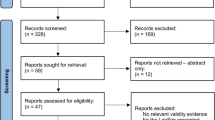Abstract
Background
Simulation using virtual reality (VR) simulators is an important tool in surgical training. VR laparoscopic simulators can provide immediate objective performance assessment without observer evaluation. This study aims to explore the correlation between subjective observer evaluation and VR laparoscopic simulator performance metrics in a laparoscopic cholecystectomy (LC) simulation module.
Methods
A LC simulation module using a VR laparoscopic simulator was completed by PGY2–3 general surgery residents at a single institution. Simulation performance was recorded and evaluated by a trained evaluator using the validated Global Operative Assessment of Laparoscopic Skills (GOALS) form, the Objective Structured Assessment of Technical Skills (OSATS) form, and a LC-specific simulation assessment form (LC-SIM). Objective performance metrics were also obtained from the simulator system. Performance before the curriculum (pre-test) and after the curriculum (post-test) were compared.
Results
Fourteen residents were included in the study. There were significant improvements from pre-test to post-test on each component of GOALS, OSATS, and LC-SIM scores (all p values < 0.05). In terms of objective simulator metrics, significant improvements were noted in time to extract gallbladder (481 ± 221 vs 909 ± 366 min, p = 0.019), total number of movements (475 ± 264 vs 839 ± 324 min, p = 0.012), and total path length (955 ± 475 vs 1775 ± 632 cm, p = 0.012) from pre-test to post-test. While number of movements and total path lengths of both hands decreased, speed of right instrument also decreased from 4.1 + 2.7 to 3.0 ± 0.7 cm/sec (p = 0.007). Average speed of left instrument was associated with respect for tissue (r = 0.60, p < 0.05) and depth perception (r = 0.68, p < 0.05) on post-test evaluations.
Conclusion
Our study demonstrated significant improvement in technical skills based on subjective evaluator assessment as well as objective simulator metrics after simulation. The few correlations identified between the subjective evaluator and the objective simulator assessments suggest the two evaluation modalities were measuring different aspects of the technical skills and should both be considered in the evaluation process.

Similar content being viewed by others
References
Nagendran M, Gurusamy KS, Aggarwal R, Loizidou M, Davidson BR. 2013 Virtual reality training for surgical trainees in laparoscopic surgery. Cochrane Database Syst Rev Doi: https://doi.org/10.1002/14651858.CD006575.pub3
Walsh CM, Sherlock ME, Ling SC, Carnahan H. 2012 Virtual reality simulation training for health professions trainees in gastrointestinal endoscopy. Cochrane Database Syst Rev 13;(6): e008237. doi: https://doi.org/10.1002/14651858.CD008237.pub2. Update in: Cochrane Database Syst Rev. 2018 Aug 17;8:CD008237. PMID: 22696375
Abdelsattar JM, AlJamal YN, Ruparel RK, Rowse PG, Heller SF, Farley DR (2018) Correlation of objective assessment data with general surgery resident in-training evaluation reports and operative volumes. J Surg Educ 75:1430–1436
Aggarwal R, Crochet P, Dias A, Misra A, Ziprin P, Darzi A (2009) Development of a virtual reality training curriculum for laparoscopic cholecystectomy. Br J Surg 96(9):1086–1093. https://doi.org/10.1002/bjs.6679
Martin JA, Regehr G, Reznick R, MacRae H, Murnaghan J, Hutchison C, Brown M (1997) Objective structured assessment of technical skill (OSATS) for surgical residents. Br J Surg 84(2):273–278. https://doi.org/10.1046/j.1365-2168.1997.02502.x
Vassiliou MC, Feldman LS, Andrew CG, Bergman S, Leffondré K, Stanbridge D, Fried GM (2005) A global assessment tool for evaluation of intraoperative laparoscopic skills. Am J Surg 190:107–113
Williams RG, Sanfey H, Chen XP, Dunnington GL (2012) A controlled study to determine measurement conditions necessary for a reliable and valid operative performance assessment: a controlled prospective observational study. Ann Surg 256(1):177–187. https://doi.org/10.1097/SLA.0b013e31825b6de4 (PMID: 22751518)
Aggarwal R, Grantcharov TP, Eriksen JR, Blirup D, Kristiansen VB, Funch-Jensen P, Darzi A (2006) An evidence-based virtual reality training program for novice laparoscopic surgeons. Ann Surg 244(2):310–314. https://doi.org/10.1097/01.sla.0000218094.92650.44.PMID:16858196;PMCID:PMC1602164
Wilson M, McGrath J, Vine S, Brewer J, Defriend D, Masters R. 2010 Psychomotor control in a virtual laparoscopic surgery training environment: gaze control parameters differentiate novices from experts. Surg Endosc 24(10): 2458–64 doi: https://doi.org/10.1007/s00464-010-0986-1
Bell AK, Zhou M, Schwaitzberg SD, Cao CG (2009) Using a dynamic training environment to acquire laparoscopic surgery skill. Surg Endosc 23(10):2356–2363. https://doi.org/10.1007/s00464-009-0346-1
Binkley J, Bukoski AD, Doty J, Crane M, Barnes SL, Quick JA (2019) Surgical simulation: markers of proficiency. J Surg Educ 76:234–241
Acknowledgements
This manuscript was accepted for an oral presentation at the Society of American Gastrointestinal and Endoscopic Surgeons (SAGES) 2021 Annual Meeting in Las Vegas, NV from August 31st to September 3rd, 2021
Funding
None.
Author information
Authors and Affiliations
Corresponding author
Ethics declarations
Disclosures
Drs Kojima, Wong, and Kristine Kuchta have no conflicts of interest or financial ties to disclose. Dr Ujiki receives grant funding from Medtronic [ERP-2020 1228]. Drs Linn, Haggerty, and Ujiki receive payment for lectures from Gore. Dr Haggerty is a paid consultant to Medtronic. Dr Ujiki is a board member for Boston Scientific, is a paid consultant for Olympus and Cook, and receives payment for lectures from Medtronic and Erbe.
Additional information
Publisher's Note
Springer Nature remains neutral with regard to jurisdictional claims in published maps and institutional affiliations.
Rights and permissions
About this article
Cite this article
Kojima, Y., Wong, H.J., Kuchta, K. et al. Subjective vs. objective assessment of simulation performance on laparoscopic cholecystectomy: are we evaluating the right things?. Surg Endosc 36, 6661–6671 (2022). https://doi.org/10.1007/s00464-021-08936-7
Received:
Accepted:
Published:
Issue Date:
DOI: https://doi.org/10.1007/s00464-021-08936-7




